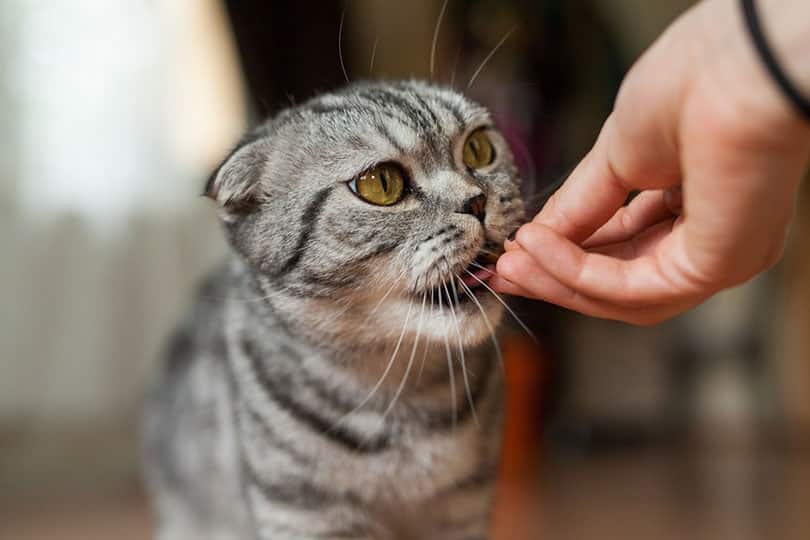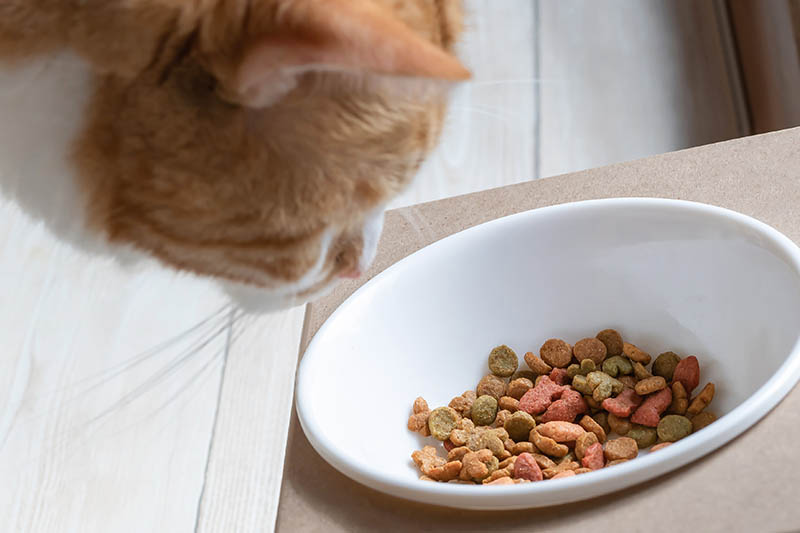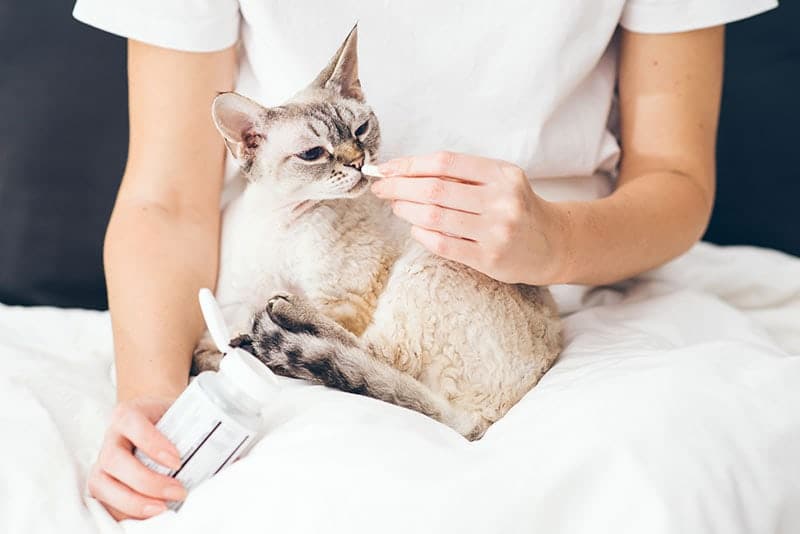Cats are family members, and we want to ensure they’re happy, healthy, and get all the nutrients they need to thrive. Cats require protein-heavy diets, much like their wild cousins. Because they’re obligate carnivores, felines absorb nutrients from animal protein. And they also have specific dietary requirements regarding protein, fat, minerals, and vitamins.
Cats that don’t receive the required nutrients often have dry, dull, slowly-growing fur. Whether you need to supplement your cat’s diet depends on several factors, including whether you feed your pet homemade or commercial food, the age of your cat, and your pet’s specific health needs. If your buddy is healthy and you’re feeding them high-quality commercial cat food, supplementing your cat’s diet may do more harm than good.1 Cats eating homemade food often need nutritional supplements to get all the necessary vitamins, minerals, and amino acids.

Which Cats Benefit from Supplementation?
Veterinarians often recommend supplementation with glucosamine and chondroitin to manage feline arthritis.2 Weight management and senior commercial formulations often include these two joint-soothing compounds, so you don’t have to bother with supplements unless your cat won’t tolerate a food change. If you prefer to provide your cat with a supplement, use chewable treats or powders you can mix into your pet’s food to avoid convincing your furry friend to swallow a pill.
While making your cat’s food from scratch ensures you can control what goes into your buddy’s body, it can sometimes result in feline nutritional deficiencies due to the difficulty of creating recipes that include all the vitamins, amino acids, and minerals cats must have to remain healthy.
Finding the right mix to meet all your pet’s dietary needs can be complex and time-consuming. Most veterinarians suggest working with a feline nutritional consultant who can provide tested recipes for homemade options that include all the nutrients your cat requires. Supplementation is almost always part of these plans.

What Kind of Supplements Should I Give My Cat?
Cat supplements are designed by veterinarians specifically for feline consumption. Human vitamins are never appropriate for cats. They are often too strong for pets, leading to vitamin toxicity. And most human multivitamins contain vitamin D, which is poisonous to cats when consumed in sufficient quantities.
Vitamins specifically made for feline consumption usually come in small, cat-sized doses and often only contain one or two vitamins or minerals to facilitate accurate dosing. Supplements may seem harmless since they don’t require a prescription to obtain, but that doesn’t mean these products can’t cause problems, particularly when combined with other medications.
Always consult with your cat’s veterinarian before giving your pet nutritional supplements. Let the veterinarian examine your pet to ensure there’s nothing serious going on that could be causing your cat’s nutritional deficiencies before heading to the pet store to stock up on supplements. If you choose to make your cat’s food at home, a feline nutritionist can identify any issues with your pet’s diet and suggest appropriate ways to correct any problems.
Can Giving Cats Feline Supplements Be Harmful?
Yes, supplements are dangerous if they’re already eating high-quality cat food that meets their nutritional needs. Cats that eat commercial food with nutrients they don’t need or consume too many supplements in addition to their regular commercial diets often suffer physical problems related to nutrition. These cats demonstrate the same signs, such as dull coats and dry skin, as pets that aren’t getting the proper nutrients.
Giving your cat a multivitamin can also be problematic if you’re feeding them homemade food. Without knowing the precise nutritional profile of what your cat is eating, you risk hurting your pet by giving them more nutrients than is healthy for them. Speak with a feline nutritionist to get help developing a science-based homemade diet for your pet.

How Do I Identify a High-Quality Commercial Cat Food?
Look for products featuring an American Association of Feed Control Officials (AAFCO) statement of nutritional adequacy. The AAFCO sets the guidelines for feline nutrition that state agencies use to regulate pet food. Cats require diets consisting of approximately 26% protein and 9% fat. They also require trace amounts of minerals such as zinc, manganese, and selenium. Foods with an AAFCO statement of adequacy meet baseline feline nutritional requirements for protein, fat, vitamins, minerals, and amino acids, such as taurine.
It’s best to select a brand composed primarily of meat proteins; products are listed in order of volume on ingredient list labels. Brands with a nourishing protein first on the ingredient list are great choices. Look for blends featuring whole meats such as duck, chicken, beef, salmon, or tuna.
Certain breeds, such as Savannahs, have higher protein needs than most cats. They do best on low-grain, high-protein diets. With these sorts of hybrid cats, it’s important to follow all feeding instructions provided by your breeder and veterinarian.
If your cat has a sensitive stomach, look for a single-protein recipe. Also, cats that could benefit from a bit of additional hydration often do well with a predominantly wet food diet.
Use the feeding instructions provided by the pet food manufacturer as a guide to ensure your cat gets an appropriate amount to eat, but beware of overfeeding! Ensuring your cat maintains a reasonable weight is fundamental to supporting their health since obese cats are at heightened risk of developing conditions such as osteoarthritis and bladder stones.

Conclusion
Healthy cats that eat high-quality commercial cat food seldom benefit from nutritional supplementation and getting too many vitamins, and minerals can be just as problematic as not getting enough! Pets with specific conditions such as osteoarthritis often benefit from extra chondroitin and glucosamine, and kitties eating homemade diets almost always require supplementation.
If your pet’s fur starts to become dry or begins to change color, make an appointment to have them seen by the veterinarian, as these signs often indicate the presence of a nutritional deficiency.
You Might Also Be Interested In:
Featured Image Credit: Veera, Shutterstock





